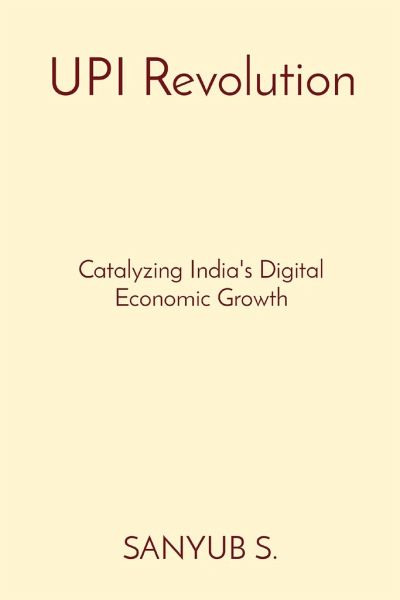
UPI Revolution
Catalyzing India's Digital Economic Growth
Versandkostenfrei!
Versandfertig in 1-2 Wochen
23,99 €
inkl. MwSt.

PAYBACK Punkte
12 °P sammeln!
In the context of the development of India's economy, the introduction of the Unified Payments Interface (UPI) has emerged as a revolutionary force, thereby propelling the country into a new era of digital financial prowess. "UPI Revolution: Catalyzing India's Digital Economic Growth" digs into the deep tapestry of UPI's influence, unraveling the threads that weave together technological innovation, economic empowerment, and financial inclusion. The book is titled "UPI Revolution." Initially, the book delves into the history of the Unified Payments Interface (UPI), tracing its origins to addre...
In the context of the development of India's economy, the introduction of the Unified Payments Interface (UPI) has emerged as a revolutionary force, thereby propelling the country into a new era of digital financial prowess. "UPI Revolution: Catalyzing India's Digital Economic Growth" digs into the deep tapestry of UPI's influence, unraveling the threads that weave together technological innovation, economic empowerment, and financial inclusion. The book is titled "UPI Revolution." Initially, the book delves into the history of the Unified Payments Interface (UPI), tracing its origins to address the difficulties that were present in the digital payment environment that was already in existence. The story is told against the backdrop of a technology landscape that is undergoing rapid change. At this time, the requirement for a payment system that is not only secure but also smooth and interoperable became increasingly obvious. While the story progresses, the historical setting offers a detailed perspective of the digital payment environment in India prior to the establishment of the Unified Payments Interface (UPI). For the purpose of shedding light on the regulatory frameworks and crucial government activities that fostered the growth of UPI, the book dives into the reasons that prepared the road for its acceptance and use. The book devotes considerable attention to the subject of UPI's technology infrastructure, which is the driving force behind the organization's success. The reader is provided with an understanding of the architecture of the Unified Payments Interface (UPI), its interaction with financial systems, and the stringent security measures that are in place to protect user data and transactions. There is a major chunk of the tale that is devoted to the influence that UPI has had on businesses. This book demonstrates how the Universal Payments Interface (UPI) has been a catalyst for transformation, particularly among Small and Medium Enterprises (SMEs), creating an environment that is conducive to growth. Additionally, it investigates the mutually beneficial relationship that exists between the Unified Payments Interface (UPI) and the e-commerce industry, focusing on the expedited business transactions that have become an essential component of the economic ecology. In addition to focusing on the economic hubs, the narrative investigates the role that UPI plays in promoting financial inclusion. The book explains how the Unified Payments Interface (UPI) has become a significant tool in banking the unbanked, entering rural areas, and creating success stories in the sphere of financial inclusion through the use of fascinating case studies. In spite of the fact that it is a celebration of UPI's achievements, the book does not shy away from expressing its concerns. Security concerns, regulatory impediments, and the need for technology updates are examined, which provides a full overview of the challenges that have been met on the path of UPI as well as the solutions that have been adopted. As the book draws to a close, it concludes by looking ahead to the future and analyzing the developing tendencies and breakthroughs in the field of digital payments. A future in which the Unified Payments Interface (UPI) continues to play a major role in India's economic growth is envisioned, during which the UPI's position in the global environment is investigated, with insights drawn from overseas case studies. "UPI Revolution" is an in-depth investigation into the transformative journey that the Unified Payments Interface (UPI) has taken, beginning with its conception and continuing to have an impact on the digital economic landscape of India. The purpose of this publication is to provide policymakers, industry leaders, and anybody else who is interested in the nexus of technology, finance, and economic advancement with a valuable resource. <












